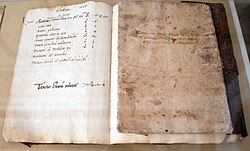Croatian surnames are surnames used by the people of Croatia, reflecting the country’s history, traditions, and the influences of various cultures on the Croatian people, both on Croatia proper as well as the Croatian diaspora throughout the former Yugoslavia, Western Europe, Australia, North America and the significant Croatian community in Chile.[1] Some Croatian surnames are common to Serbian, Montenegrin and Bosniak surnames as well, due to a shared language and culture; however, there are some surnames that are distinctively either Croatian, Serbian, Bosniak or Montenegrin.[2]
History of Croatian surnames

Croatian surnames can be traced back to the arrival of the Croats in modern-day continental Croatia in the early 7th century. At that time, Croats used Slavic names and corresponding naming customs. However, with modernization and globalization in the last century, given names and surnames have expanded beyond typical Slavic traditionalism and have included borrowed names from all over the world. Despite this, surnames in Croatia tend to be predominantly Slavic in origin. In earlier times, most women did not use surnames, and would identify themselves according to the name of a male family member instead.[3] In the past, traditional titles were bestowed upon Croatian royalty and nobility to indicate their privileges and social status. These titles were commonly used with the person's full name or simply their surname. In present-day society, honorific titles are employed by families across the country when addressing older relatives or as a gesture of general respect. As time has passed, Croatian surnames have been influenced by various factors, such as historical migrations, foreign names, and the impact of globalization. Consequently, many Croatians today bear first names of German, Hungarian, Italian, Turkish or Romanian origin. However, due to the limitations of the Croatian alphabet, numerous names undergo changes in pronunciation, spelling, or structure to conform to the naming customs of the country; some of these surnames, like Frankopan, Bunić, Tudišević and Čikulin are associated with by the Croatian nobility.[4]
Croatian naming conventions
Traditionally, Croatian naming conventions follow the Eastern name order, where the family name comes before the first name (e.g., Kačić Darko). However, many Croatians use nowadays the Western name order (first name followed by family name) in different contexts and countries. In the Brod-Posavina, Dubrovnik, Karlovac, Krapina, Osijek, Pazin, and Slavonski Brod regions, the traditional naming formula diverges slightly, just like with Portuguese surnames: for example, if the name of a person was "Tomislav Glavaš Marković", this means his legal family name would be "Glavaš" and not the assumed "Marković" (which is another given name, usually named after the family's patriarch); this person would go by "Tomislav (given name) Glavaš (family name)".[5] Upon marriage, wives often take their husband’s family name upon marriage, either as a second surname or by hyphenating it with their own surname.[6]
Croatian surnames of patronymic and matronymic origin

It is common for Croatian surnames to have the suffix -ić, which is a diminutive suffix traditionally combined with either the name or profession of the parent.[6] While the suffix -ić is generally assumed to indicate a patronymic, it can also be used for a matronymic, or a name derived from the mother's name or personal characteristics. Some examples of patronymic surnames include Antić (child of Ante), Filipović (child of Filip), Jurić (child of Jure), Vuković (child of Vuk "the wolf") and Stjepanić (child of Stjepan), and matronymic surnames, while less common, they can still be found, such as Anić (child of Ana) and Babić (child of a baba, or old woman).
Croatian surnames of occupational origin
Croatian surnames of descriptive origin
Croatians have the singularity of having relatively common surnames that are originated in the nickname given to describe a person, like:
Some of these surnames can have a very unusual meaning, like:
Croatian surnames of toponymic origin
Croatian surnames of ethnic origin
For centuries, people came and went through the lands that today comprise Croatia. Some of them stayed and became integrated into the wider Croatian society. When surnames began to be used, their ethnic origin was used as the surname of some of them, like:
Hrvat, Horvat, Hrvatin and Horvatinčić are all derived from hrvat, which means "Croat."
Popular Croatian surnames and their origins

The most common Croatian surnames are as follows:[3]
- Horvat, the most common surname in Croatia, derived from the word hrvat, meaning "Croatian"
- Kovačević, originating from the profession Kovač, which means "blacksmith"
- Babić, derived from the given name Baba
- Marić, originating from the given name Marija, the Croatian version of "Mary"
- Novak, meaning "new" or "newcomer"
- Jurić, derived from the given name Juraj, the Croatian version of "George"
- Kovačić, another variation of the surname originating from the profession Kovač
- Knežević, derived from the title knez, meaning "duke"
- Marković, originating from the given name Marko, the Croatian version of "Mark"
- Petrović, derived from the given name Petar, the Croatian version of means "Peter"
Geographic locations for Croatian surnames
People with Croatian surnames are typically located in Croatia, with a significant number also residing in neighboring countries such as Bosnia and Herzegovina, Serbia, and Montenegro. Additionally, Croatian diaspora communities can be found in countries like the United States, Canada, Chile, Australia, and various European nations.[8]
Celebrities with Croatian surnames
- Luka Modrić, a renowned Croatian footballer who plays for Real Madrid and the Croatian national team.
- Goran Šimun Ivanišević, a retired Croatian tennis player, best known for winning the Wimbledon Championships in 2001.
- Rade Šerbedžija, a Croatian actor and director, known for his roles in Hollywood films such as "Mission: Impossible II" and "Harry Potter and the Deathly Hallows: Part 1."
- Kolinda Grabar-Kitarović, president of Croatia between 2015 and 2020
- Gabriel Borić Font, current president of Chile
Explore more about Croatian surnames
See also
References
- ↑ Inmigración a Chile
- ↑ Differences between Croatian and Serbian names. Croatian Genealogy and Family History
- ↑ 3.0 3.1 20 Most Common Croatian Surnames. CroatiaWeek
- ↑ "Frangipane, Mario". Treccani - Enciclopedia Italiana (online edition). Retrieved 2017-10-16.
- ↑ Naming Practices in Serbia, Croatia, and Bosnia. Government of the United Kingdom of Great Britain
- ↑ 6.0 6.1 Croatian culture|Naming. Cultural Atlas
- ↑ Census reveals a number of amusing Croatian surnames. CroatiaWeek
- ↑ Diaspora Croata


